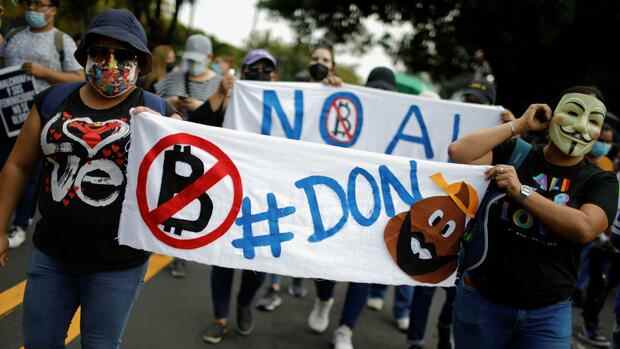Mexico City This national holiday in El Salvador was different from the previous ones – at least significantly different from what the autocratic head of state Nayib Bukele had imagined. Instead of celebrating 200 years of independence from Spain on Wednesday, the Salvadorans took to the streets against their head of state for the first time since he took office a good two years ago.
In the center of San Salvador, strangers set fire to a Bitcoin ATM. Otherwise, the protests were largely peaceful. The protester Betsi Gaviria says: “The Bitcoin was the drop that broke the barrel.” She is against a re-election of Bukele. And: “We are defending ourselves against the burgeoning dictatorship,” said the 49-year-old.
In the evening, Bukele surprisingly went on air nationwide. The autocrat furiously accused the international community of financing the protests and scourging him as a “dictator”.
Top jobs of the day
Find the best jobs now and
be notified by email.
The reason for the protests on Independence Day is also the growing fear that Bukele is leading the country further and further into authoritarianism. He sometimes treats critical reporters unworthily, secretly negotiates with representatives of organized crime and has already sent the military to parliament to enforce laws.
High popularity ratings despite growing criticism
In less than half a year, he also replaced resistance judges at the Constitutional Court, thus ensuring that the newly occupied Constitutional Court lifted the ban on re-election. So the anti-democrat can run for a new term in 2024. The US, El Salvador’s most important partner, is now seeing Bukele’s actions with growing concern.
José Manuel Vivanco, America director of the human rights organization “Human Rights Watch”, goes one step further: “Bukele follows the same script as Chávez, only in record time.”
The former Venezuelan ruler also changed over the years from a popular elected head of state to an autocrat. The US magazine “Time” warns in its latest issue that the Salvadoran head of state is the most flagrant example of “intolerance” and action against critics and opposition in Latin America.
Despite the growing criticism, Bukele is still extremely popular in his country – even if the approval rate has now fallen from 90 to below 80 percent. His supporters praise him for having safe streets and neighborhoods because the president made “Maras” deals with youth gangs. The distribution of food packages to the needy also contributed to its popularity.
But in the shadow of this popularity, he wants to rebuild the state in such a way that power is secure for him. On television he made it clear how little criticism he can take. “I’ve been in power for two years and three months now and haven’t even used tear gas. But if foreign countries continue to finance the protests against me, it may become necessary at some point, ”he openly threatened.
Poll: Most of the population is against Bitcoin
Central bankers, financial experts and governments around the world are now watching El Salvador’s pilot project with great interest. The population fears the virtual currency. In a survey by the University of Francisco Gavidia in San Salvador, 77 percent of those surveyed spoke out against the introduction of Bitcoin at the beginning of July. A young student said at the demo that people were “fed up with a populist who is also endangering their savings and pensions with Bitcoin”.
At the beginning of June, the parliament controlled by Bukele’s “New Ideas” party passed the two-page Bitcoin law overnight. The 40-year-old autocrat, who gives himself a hipster image with a leather jacket, a baseball cap put on the wrong way round and his Twitter diplomacy, justifies the introduction of Bitcoin by saying that it would eliminate or reduce the high costs of remittances for Salvadorans living abroad . “Our people pay $ 400 million a year in transfer fees. These savings alone will be a huge benefit, ”said Bukele.
The President of El Salvador is leading the country into an autocracy.
(Photo: imago images / Agencia EFE)
Experts like development economist and Central America expert Christian Ambrosius see Bitcoin more as a playing field for investors. Contrary to what the government claims, Bitcoin does not create “financial inclusion”.
According to Ambrosius, this would require opportunities for asset accumulation, protection against financial risks and access to cheap loans and insurance. The professor at the Latin America Institute at the Free University of Berlin criticizes a means of payment like Bitcoin that does not do this. Not to mention the fact that not even half of Salvadorans have internet access.
More: Latin America under the spell of Bitcoin
.

